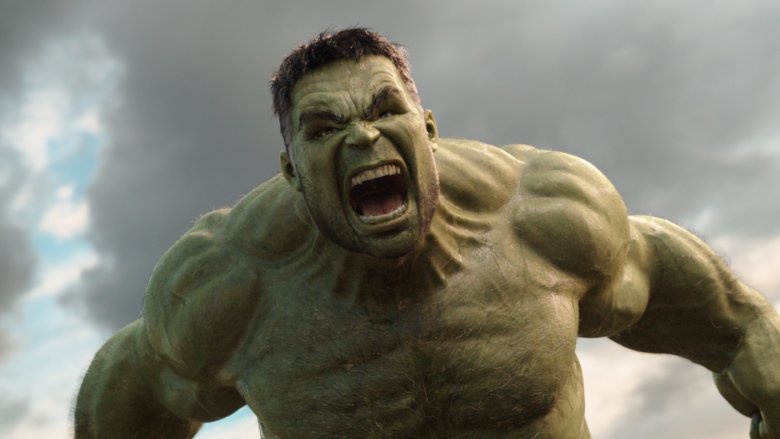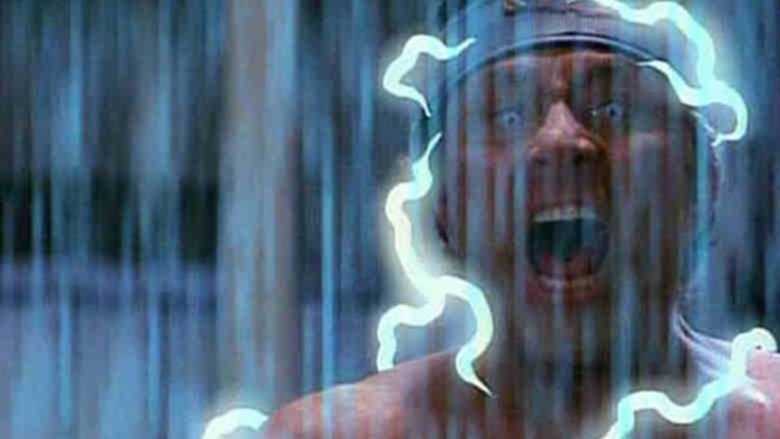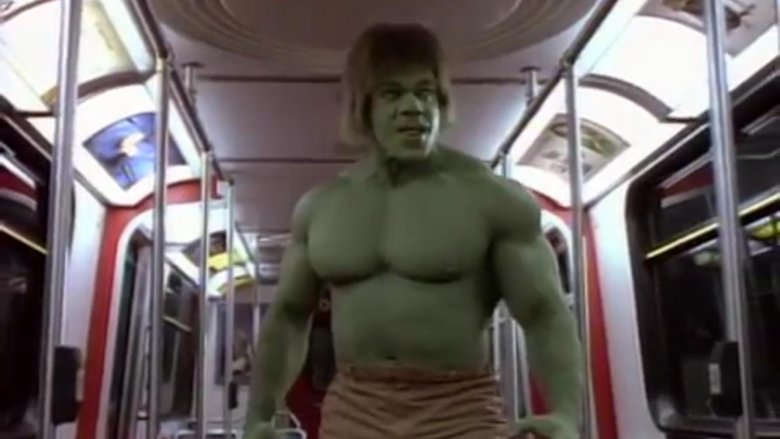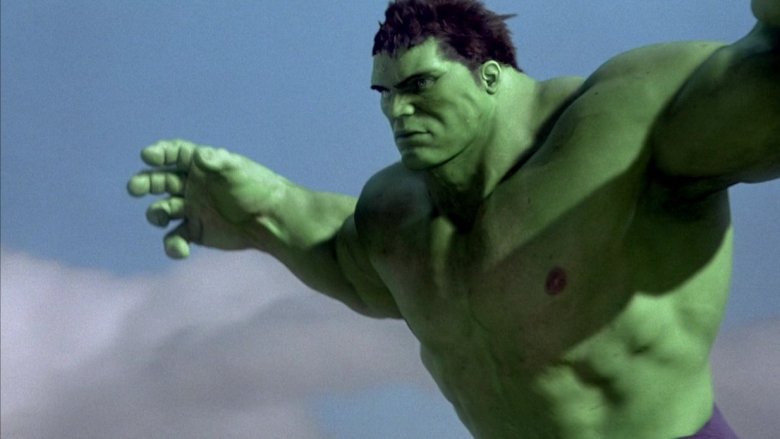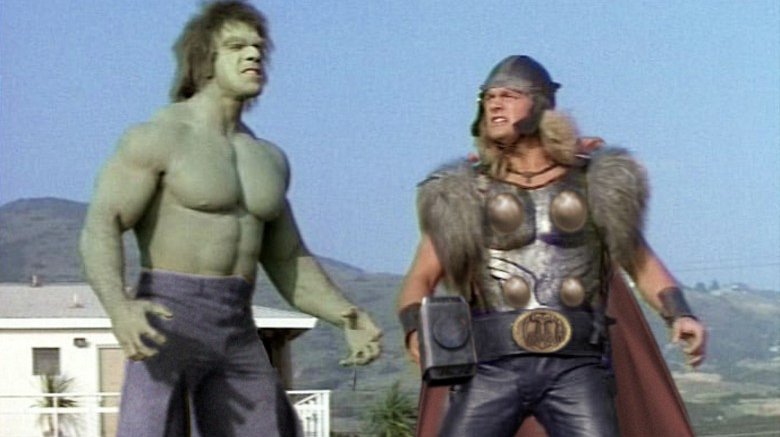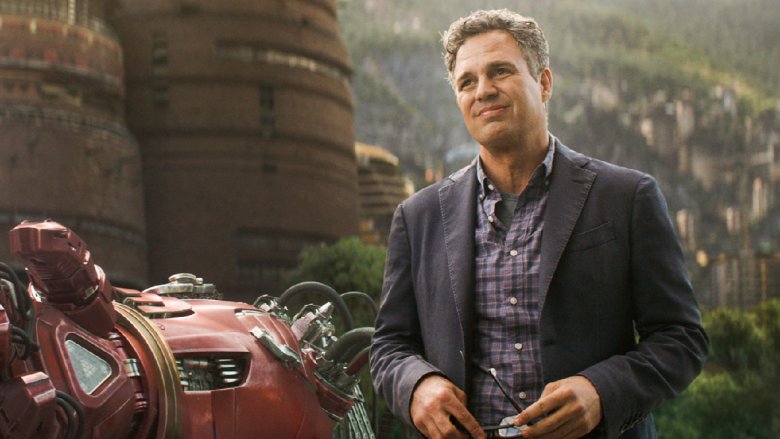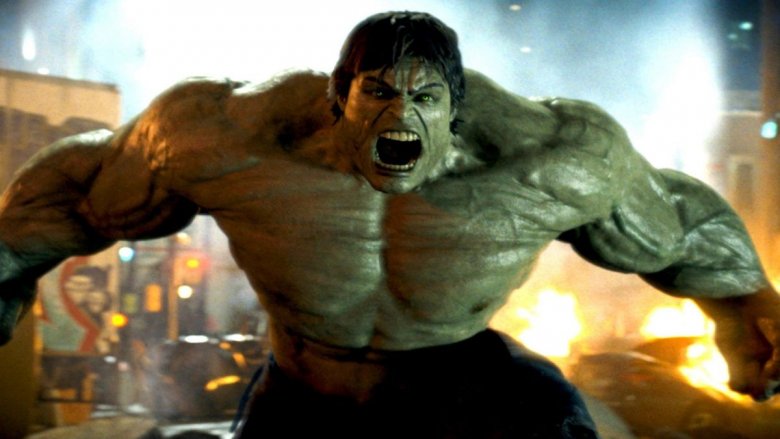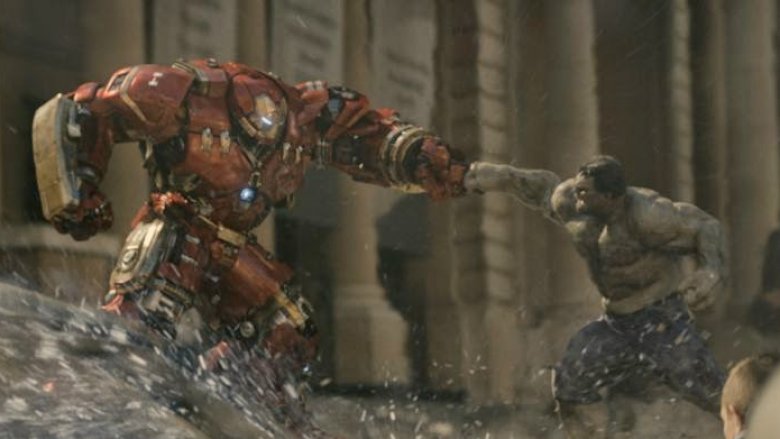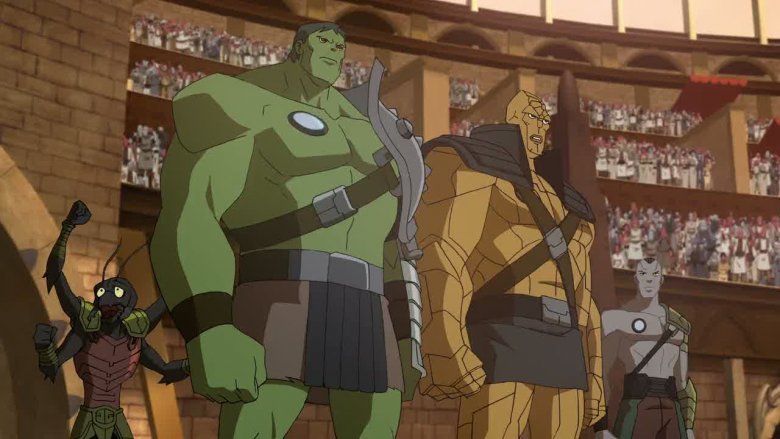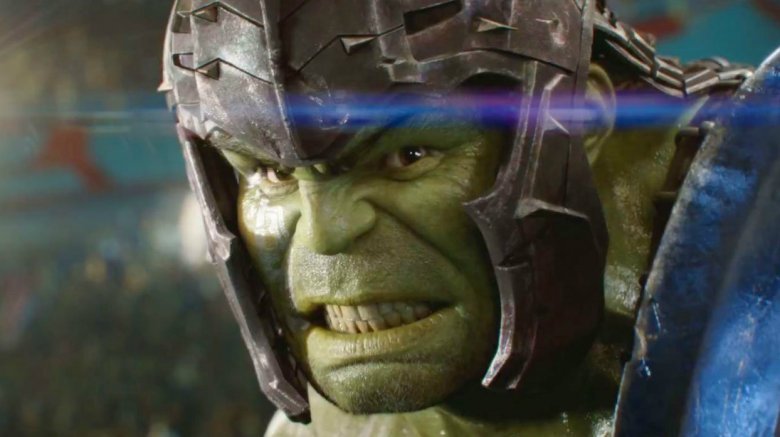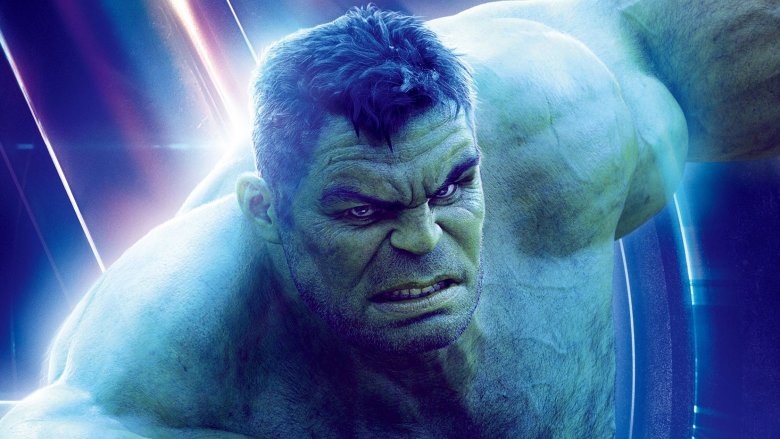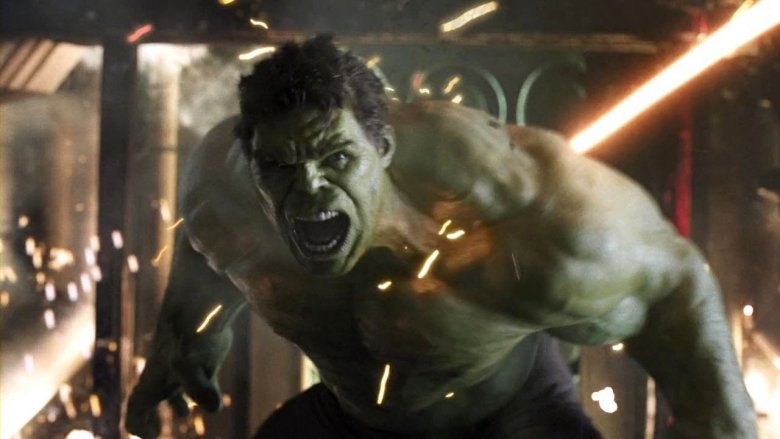Every Hulk Movie Ranked From Worst To Best
It may not seem like it, considering the chances of Mark Ruffalo getting a solo Hulk movie are slim-to-none, but the Hulk's been one of the most visible superhero movie stars for decades. After the modern superhero craze first broke with X-Men, Ang Lee's ill-fated Hulk was one of the first comic book superhero flicks to follow. While neither Lee's Hulk nor 2008's Incredible Hulk earned much critical acclaim or massive pay days, the Green Goliath remains in the eye of the superhero storm. He's become a regular fixture in the Marvel Cinematic Universe — aside from the usual Avengers team-ups, Ruffalo co-starred in 2017's Thor: Ragnarok and made a post-credits cameo in Iron Man 3.
Even before the MCU, the Hulk earned more visibility than your average Marvel character largely because of the live-action '70s Incredible Hulk TV series starring Bill Bixby as David Banner (instead of Bruce, and there is some disagreement about the reason for the name change) and Lou Ferrigno as his green-skinned alter ego. That version of the character was revived in the late '80s for a trilogy of made-for-TV movies which ultimately killed off the TV Hulk.
Including all the MCU flicks featuring Hulk (but not counting Iron Man 3 because, come on), those comparatively low-tech TV movies, and just one animated flick that gave fans probably the most faithful adaptation they're likely to get of a Hulk comic, here's a look back at all the Hulk movies, ranked from worst to best.
The Death of the Incredible Hulk (1990)
The final Incredible Hulk revival TV movie was The Death of the Incredible Hulk. David Banner dies at the end, but his death wasn't meant to be permanent. A follow-up, The Revenge of the Incredible Hulk, was planned (according to a 1990 issue of Starlog), but it never happened. In his 2011 book You Wouldn't Like Me When I'm Angry, Paul Jankiewicz claims Revenge was cancelled because of Bixby's failing health (Bixby died from complications due to prostate cancer in 1993). But in a 2014 edition of Back Issue!, Gerald Di Pego, who wrote two of the TV movies and was set to write Revenge, claims Bixby was in good health when the fourth movie was canceled. Revenge got the axe, according to Di Pego, purely because of Death of the Incredible Hulk's low ratings.
Its low ratings meant few people got to see the moronic manner of the Hulk's death: he falls from a plane.
For context, in 2007's Incredible Hulk #104, the Hulk falls to a planet from orbit and he does it for fun. He not only survives, but does it with a big smile. If you're a fan of both the comics and the show, you learned a long time ago to accept that, power-wise, Ferrigno's Hulk wasn't even close to the comic book version. But still, falling from a plane? Really? That's how you kill the Hulk? That's like Logan ending with Wolverine dying from the flu.
The Trial of the Incredible Hulk (1989)
Part of the goal of the late '80s Incredible Hulk revival was to use a familiar face to introduce some other Marvel franchises to audiences. That's why the first of them, 1988's The Incredible Hulk Returns, gave TV audiences a live-action Thor (Eric Allan Kramer) decades before Chris Hemsworth took up the hammer. And that's why, if you couldn't already guess, 1989's Trial of the Incredible Hulk premiered a live-action Matt Murdock (Rex Smith), a.k.a. Daredevil. Hell's Kitchen's favorite son represents David Banner after Banner witnesses a crime linked to the Kingpin (John Rhys-Davies).
While Daredevil fans likely wouldn't put Trial of the Incredible Hulk any higher on a list than Hulk fans would, perhaps the worst crime of Trial is that it prioritizes the Man Without Fear over the Green Goliath. In the final fight of the movie, Banner hits a dude with a vase, and that's the closest the Hulk gets to contributing to the climactic take-down. Everything else is in the hands of Daredevil's badly choreographed martial arts. Considering it would still be another 26 years before Daredevil got his own live-action Netflix series, sacrificing Hulk for a few extra kicks clearly wasn't worth it.
Hulk (2003)
Ang Lee's Hulk is not well-loved, and for good reasons. But maybe it deserves a break. Part of what makes it so bad, after all, is a director who aims for something more than a summer popcorn flick.
The script isn't great and most of the performances are wooden, though Sam Elliott is perfect as General Ross and Nick Nolte is a great villain who feels like he's in the wrong movie. The story is often boring, with Lee waiting a long time to introduce the Hulk, and waiting even longer for the film's only impressive action scene, Hulk's battle in the desert with the military. The effects are inconsistent — some shots are stunning, and others are embarrassingly cartoonish.
But Lee was trying to do more with Hulk. There's a lot of mythic imagery, like the scene in which Banner's father becomes a giant electrical creature reminiscent of Zeus. Lee connects the Hulk with nature, which is why he works in moments with the Hulk mesmerized by certain rock formations, and why in the final moments of the film we see a number of green animals hanging out with Banner before he presumably Hulks out once more.
Lee tries to make something unique and entertaining. He thoroughly fails at the latter, but you have to admit the guy tries.
The Incredible Hulk Returns (1988)
In 1988, American network television got its first new installment of David Banner's lonely saga since 1982 in the made-for-TV movie The Incredible Hulk Returns. Along with Bixby and Ferrigno, Incredible Hulk Returns stars Eric Allan Kramer as Thor and Steve Levitt as the thunder god's classic alter-ego Donald Blake. You may recall this is the fake name Erik Selvig (Stellan Skarsgård) gives S.H.I.E.L.D. when they're holding Thor captive in 2011's Thor, as well as the name Jane Foster (Natalie Portman) peels off a shirt as the freshly de-powered Thor looks for clothes.
There isn't much that's been on either a TV or theater screen that isn't better than these TV movies, but Incredible Hulk Returns is the most bearable. Unlike the final TV movie, the Hulk doesn't die in a ridiculous way, and unlike Trial, the guest superhero doesn't steal the show. Hulk and Thor have their compulsory battle in a lab, almost 25 years before Hemsworth and Mark Ruffalo would tussle on the deck of a Helicarrier. And of course, they team up later for a fight that feels way more A-Team than any fight including the Hulk and Thor really should. Their one-on-one is worth watching, if for no other reason than it may leave you thinking, "Why doesn't the MCU's Hulk just flex his muscles six times in a row rather than attacking right away? Seems like a sound strategy."
Avengers: Infinity War (2018)
Now, if this were a different kind of ranked movie list, there's a really good chance Avengers: Infinity War would make it a lot closer to the top. But since we're ranking Hulk movies, it doesn't have much to offer, and the reasons shouldn't be a mystery.
After that first opening scene on the refugee ship, the Hulk disappears. We see a few flashes of green in New York City and later in Wakanda, when Bruce Banner tries and fails to get the "Other Guy" to come out, but that's it. There's no tussle between Hulk and the Hulk-sized Cull Obsidian, no chance for him to tear through the Outriders with ease like we know he could, and no second shot at Grimace himself.
Worse than his absence, Hulk gets Worfed. If you're not familiar with "The Worf Effect," the name refers to how often Worf (Michael Dorn) gets beat up on Star Trek: The Next Generation. It's an easy, oft-used trope — the bad guy beats up the biggest, baddest good guy early in the story so you can sell the villain as a threat to the audience. That's why Thanos beats up the Hulk, and that's why the smackdown happens in the first few minutes of the film.
The Hulk's "Worfing" or his almost complete absence would each be bad enough on their own, but together? For Hulk fans, it adds some surprising disappointment to Infinity War.
The Incredible Hulk (2008)
Incredible Hulk is probably on no one's list of top five favorite MCU films, but it isn't bad. It introduces the green guy much sooner than its 2003 predecessor, and we get a lot more action. Director Louis Leterrier gives us a classic Hulk villain, the Abomination (Tim Roth), and lays the foundation for the emergence of another in the form of Dr. Samuel Sterns (Tim Blake Nelson), a name Hulk fans would recognize belonging to the mastermind villain the Leader. William Hurt is a surprising choice for General Ross, but one that works so well he remains the only Incredible Hulk alumnus to show up in any other films.
Ed Norton could have been the perfect Bruce Banner. He built his career playing characters who were meek pushovers one second and intimidating bullies the next, but Leterrier never utilizes that part of Norton's talent. We get a formulaic action flick with no real glimpse of who Bruce Banner is.
The CGI rendering of the Hulk is definitely more consistent than what we saw in Ang Lee's Hulk. The filmmakers chose a slimmer, darker-skinned man-monster. The sound of the Hulk is a huge improvement from 2003's Hulk — when he roars in challenge at the soldiers at Culver University, he sounds like a bellowing T-Rex. Still, watching Incredible Hulk now, you can't help but think how the effects look primitive compared to what we see in Avengers and everything that comes after.
Avengers: Age of Ultron (2015)
Avengers: Age of Ultron, for a Hulk fan, is a tough pill to swallow. For the sake of the plot, Iron Man (Robert Downey Jr.) needs to win their mid-movie tussle. After all, if Hulk wins and continues to rampage through Johannesburg, it's going to be a much darker and bloodier film. Still, seeing Iron Man defeat the Hulk is not fun for a Hulk fan, and in truth that fan has comic book canon to back them up. In every comic book battle between Hulk and Hulkbuster Iron Man, the Hulk either defeats Tony or it's a draw. Stark's "Thorbuster" suit isn't much better. Really, if you want to make sure Iron Man loses a fight, have him design a suit with "buster" at the end of the name.
Ultron does have some bright spots. Regardless of who wins, the Hulk/Iron Man battle is wonderfully executed. In the final conflict, Hulk's probably the only Avenger to successfully use his teeth to trash robots. He one-shots Ultron (James Spader) twice. He also saves Hawkeye's (Jeremy Renner) life... but nobody's perfect.
There are also some wonderful character moments for Hulk in Age of Ultron. Whether you like the romance with Black Widow (Scarlett Johansson) or not, it reveals some interesting sides of Banner we haven't seen before in the MCU. It also makes it possible for him to hijack a Quinjet and take a ride to a much better movie on a planet far, far away.
Planet Hulk (2010)
While most of this list is for live-action flicks, 2010's Planet Hulk is a worthy exception. Based on the 2006-07 comic storyline of the same name, Planet Hulk is about the Green Goliath being exiled by Earth's other heroes. He crashes on Sakaar, where he is made a slave and gladiator. Hulk eventually leads a revolt against the tyrannical Red King (Mark Hildreth) and becomes the new, more benevolent ruler of this savage world.
Planet Hulk was about as faithful to its source material as a comic book movie could get. Hulk's warbound (who are treated much less like comic relief here than they are in Thor: Ragnarok), the world-building of Sakaar, the fact that Hulk remains dominant and Bruce Banner is nowhere to be seen — it feels like the filmmakers are doing everything they can to remain true to the comics. Stuff is left out for time, sure. The final battle between Hulk and the Red King is a bit different and Hulk beats the tar out of Beta Ray Bill (Paul Dobson) in his final gladiator match rather than Silver Surfer. The film stops short of the cataclysmic explosion that the comic story ends with, acting as prologue to Hulk returning to Earth for payback in World War Hulk.
In the case of the last omission, ironically it's one of the best things about Planet Hulk, because it gives us something we rarely see in a Hulk movie: a happy ending.
Thor: Ragnarok (2017)
Looking at 2017's Thor: Ragnarok through the eyes of a Hulk fan can feel very bittersweet. On one hand, it's the only live-action adaptation of Planet Hulk fans are likely to get, and on the other it can bite particularly hard to know the closest a Hulk fan will get to that adaptation is a film dedicated to one of the character's biggest rivals. The Hulk's dialogue — which has been sparse-to-nonexistent before and since Ragnarok — perfectly captures what any old school Marvelite should remember of the Savage Hulk's monosyllabic speech. Yet his performance in the arena once Thor accesses his Raiden-self is less than stellar (though, technically, he does win).
Despite the contradictions, what keeps Ragnarok so close to the top of this list is the banter between Hulk and his best frenemy Thor (Chris Hemsworth). Their shouting matches, the comedic moments like Hulk's back-and-forth with Valkyrie (Tessa Thompson) or the scene where Thor gets weirded out by Hulk emerging naked from the bath, and especially the Hulk's dogged determination to take down Surtur at the end all felt spot-on. As a Hulk film it's far from perfect, but it's pretty great.
Avengers: Endgame (2019)
Infinity War gave us a lot of Banner and little Hulk, but its sequel 2019's Avengers: Endgame rewards fans with a lot of both. We learn Banner stopped treating the Hulk "like a disease" and used his genius to merge his mind with the Hulk's body.
Endgame is an epic adventure, and the Hulk gets his chance to shine much more often than in previous Avengers entries. — thanks in no small part to a fantastic CGI realization of the character. When Hulk goes back in time to Avengers, we get to enjoy his embarrassment at the earlier Hulk's more caveman persona. Once the heroes gather the Infinity Stones, only Hulk has the power to undo Thanos' purge and survive the ordeal. After Thanos' initial assault on the Avengers — when Hulk shoulders the compound's smoking debris to save his friends — we get a tribute to his classic Secret Wars feat of holding a mountain range at bay.
Only two things stop Avengers: Endgame from getting the top spot. First, there's the omission of Banner's emotional origin — which, in the comics, was necessary for the creation of Professor Hulk. The childhood abuse Banner suffered is never referenced in the movies, and it's a shame. Avengers told audiences Banner is "always angry," but it never revealed why. Second, the Hulk never gets another shot at Thanos; in fact, he doesn't get much time in the final battle at all. When the Hulk's around, you want to see as much smashing as possible.
Avengers (2012)
It's ironic that 2012's Avengers is above and beyond all other Hulk movies; not only because his name isn't even in the title, but he wasn't in it all that much. His screen time was limited to the film's two big action sequences: the Helicarrier fight and the Battle of New York, but that was enough for him to completely steal the show. Banner's "I'm always angry" moment marked the final cohesion of the team, and after that he was Avengers' most crowd-pleasing star. His response to Cap's "Smash," the Thor sucker punch in Grand Central Station, the epic thrashing of Loki in Stark Tower, and the unique form of resuscitation he uses on Tony Stark (scaring the hell out of him) are all pure Hulk gold.
The Hulk's raw power on the screen finally mirrors what we've seen in the comics, and the CGI realization was never more impressive before than it is here. For the first time, the Hulk's face genuinely looks like the green, mutated face of the actor playing Bruce Banner. And while, like in Ang Lee's Hulk, we're made to wait quite a bit to finally see the Hulk emerge, the build-up is perfect and there's enough room in the movie for him to shine in the time given. Unless the impossible happens and Mark Ruffalo gets his own solo Hulk flick, the Green Goliath is unlikely to get a better portrayal than what we saw in Avengers.
